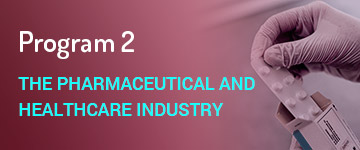UMORE - Pharmacy
Program 2
Program 2: The Pharmaceutical and Healthcare Industry

This Program describes the pharmaceutical industry environment, government regulation and the industry's role in the Australian healthcare system. It evaluates industry trends and challenges.
Program 2 is comprised of 6 modules and is estimated to take approximately 18 hours to complete.
Intended Learning Outcomes
- Describe the pharmaceutical industry environment internationally and within Australia
- Identify the key legislative frameworks that govern the pharmaceutical industry
- Describe the process of developing a medicine and obtaining its approval
- Explain the process for listing a medicine on the Pharmaceutical Benefits Scheme (PBS)
- Describe the principles and application of Quality Use of Medicines (QUM)
- Discuss the structure of, and stakeholder involvement in, the healthcare system
- Identify the National Health Priorities for Australians
Module contents
Global health is about creating equity and realising rights to health for all people worldwide. Through the collection and analysis of data from across the globe, we can describe health problems and identify trends to inform societal and political change. Global health intersects with many decisions in the policy arena including human and economic development, sustainable development, poverty and inequality, security and protection.
Health is subject to a unique dynamic - on the one hand, poor health is often a consequence of global crises such as conflict, finance, food insecurity, climate change, and pandemics; on the other hand, the whole of society bears the impact if health challenges are not well managed. Indeed, the economic consequences of governance failures in health, be they national or global, are significant. Poor health can hinder development or destroy any development gains which were achieved through great effort.
The COVID-19 pandemic exposed and intensified long-standing inequalities across income groups, disrupted access to essential medicines and health services, stretched the capacity of the global health workforce and revealed major gaps in public health and health information systems. Pre-pandemic progress in health developments have taken hits globally.
In this Module we investigate life expectancy as one of the most frequently used health indicators at both a national and global level. We analyse causes of death and disease measures, drawing connections to the Australian healthcare system, national expenditure and threats to our current level of health.
In this module we will discuss the status of the current and future global industry, including the major products and major companies and the focus of research and development within the industry, before moving on to look more specifically at the Australian pharmaceutical industry.
This module covers regulation of the pharmaceutical industry in Australia, The Therapeutic Goods Administration and the legislative frameworks including the Poisons standard.
Creating a new medicine is a long and rigorous process, typically from progressing a promising idea in the research laboratory through clinical development, to a medicine receiving approval from regulators. In this Module we will explore the research and development process and outline the Australian approval process of a medicine.
In this Module we will cover the supply of efficacious medicines in Australia. We will explore funding of medication using co-payment and some of the more important policy frameworks, organisations and concepts.
There are many organisations and peak bodies that operate in association with the pharmaceutical industry whose activities impinge on and affect the industry. This module will cover key bodies and associations that impact the pharmaceutical industry in Australia.
For more information on this or other UMORE courses, and to enrol, sign up to our iLearn website.
